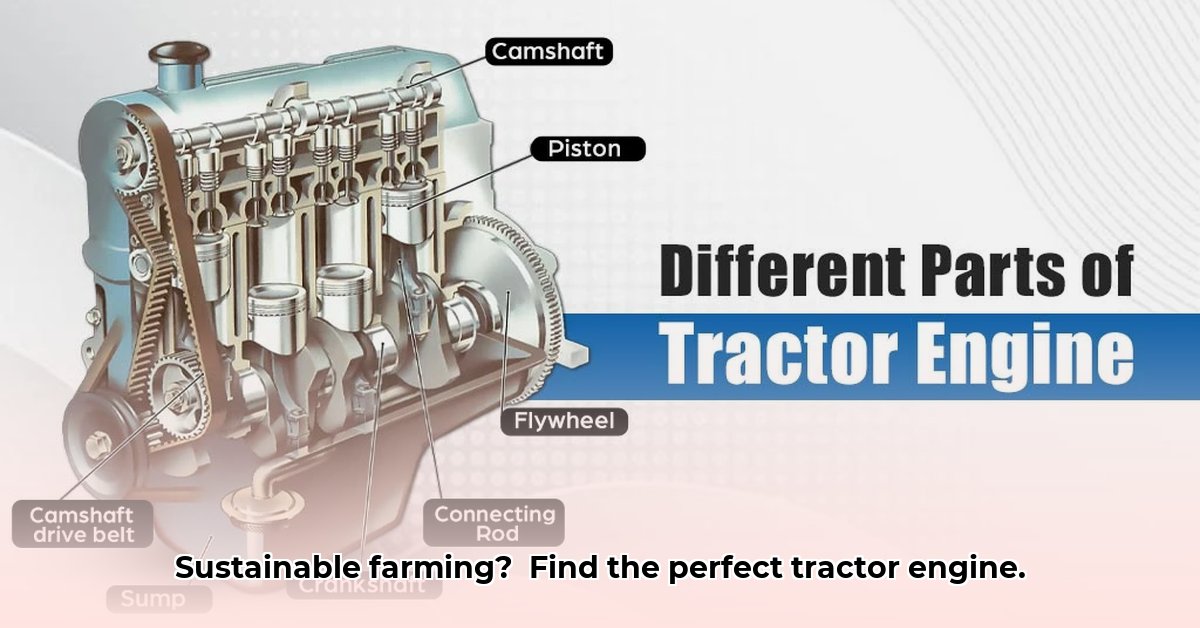
Choosing the right tractor engine is a critical decision for modern farmers, impacting both profitability and environmental sustainability. This guide explores various engine options, comparing their environmental impact, running costs, and suitability for different farm sizes and operations. We'll help you navigate the complexities of diesel, electric, and alternative fuel tractors, empowering you to make an informed decision aligned with your farming goals. For more information on engine oil selection, see our guide on tractor engine oil.
Understanding Your Farming Operation
Before considering specific engine types, assess your farm's unique needs. Consider the size of your operation, the types of crops or livestock you manage, and the land area you cover. A small-scale vegetable farm will have vastly different requirements than a large-scale grain operation. For example, a small farm might prioritize maneuverability and fuel efficiency, while a large farm might require high horsepower for heavy tillage. This initial assessment significantly streamlines the engine selection process.
Diesel Engines: The Traditional Choice
Diesel engines have long been the industry standard, offering high power and torque ideal for demanding tasks like plowing and heavy tillage. Their reliability and widespread availability, coupled with a robust network of mechanics and parts suppliers, are significant advantages. However, diesel engines produce substantial greenhouse gas (GHG) emissions and particulate matter, contributing significantly to air pollution. Furthermore, fluctuating diesel fuel prices directly impact operating costs, creating financial uncertainty. While diesel's reliability remains a strong selling point, the environmental and economic consequences must be carefully weighed. How can farmers balance the benefits of diesel’s power with its environmental impact?
Alternative Fuels: Propane and Natural Gas
Propane and natural gas engines offer a cleaner alternative to diesel, producing noticeably lower emissions. This translates to a smaller environmental footprint, aligning with sustainable farming practices. However, a major constraint is the limited refueling infrastructure in many rural areas. The scarcity of readily accessible fueling stations can severely limit the practicality of these options for many farmers. "The lack of accessible fueling stations is a significant barrier to adopting propane or natural gas tractors," notes Dr. Amelia Hernandez, Agricultural Engineering Professor at Cornell University.
Electric Tractors: The Emerging Technology
Electric tractors represent a significant step toward environmentally friendly farming, boasting zero tailpipe emissions. This makes them appealing to farmers prioritizing sustainability. However, challenges remain. Electric tractors typically carry a significantly higher upfront cost than diesel counterparts. Battery life and charging times are also limiting factors, and the available charging infrastructure in rural areas is still underdeveloped. Additionally, battery lifespan and eventual replacement costs need to be included in the long-term budget. Despite these challenges, electric tractors are a promising technology, with ongoing research focused on improving their capabilities and addressing these limitations. What innovations are needed to make electric tractors universally viable for farmers?
A Comparative Overview of Tractor Engine Options
The following table summarizes the advantages and disadvantages of each engine type:
| Tractor Engine Type | Advantages | Disadvantages |
|---|---|---|
| Diesel | High power, robust performance, readily available parts and service | High emissions, high and volatile fuel costs, increasing environmental regulations |
| Propane | Lower emissions than diesel, relatively clean burning | Limited refueling infrastructure, potentially lower power |
| Natural Gas | Lower emissions than diesel, potential for lower fuel costs (depending on source) | Limited refueling infrastructure, potential safety concerns, power limitations |
| Electric | Zero tailpipe emissions, quieter operation, potentially lower long-term costs | High initial cost, limited range, charging infrastructure limitations, battery life |
Choosing the Right Engine: A Practical Guide
Selecting the appropriate tractor engine involves a systematic approach. Follow these steps for a well-informed decision:
Assess Your Needs: Define your farm's specific requirements: workload, land size, crop type, etc.
Research Engine Options: Thoroughly investigate each engine type's pros and cons, aligning them with your farm's unique context.
Budgeting: Evaluate the initial investment, fuel costs, maintenance, and potential battery replacements (for electric tractors).
Environmental Considerations: Analyze the carbon footprint associated with each engine type, alongside local environmental regulations and incentives for cleaner technologies.
Expert Consultation: Seek advice from experienced farmers, equipment dealers, and agricultural specialists for personalized guidance.
Incentive Programs: Investigate government subsidies and tax breaks available for sustainable agricultural practices.
Long-Term Vision: Consider future technological advancements and plan for potential upgrades or replacements.
Comparing Long-Term Costs: Electric vs. Diesel
Choosing between electric and diesel tractors requires a detailed lifecycle cost analysis. While diesel tractors have a lower upfront cost, fuel and maintenance expenses can significantly increase over time. Electric tractors, despite their high initial investment, offer the potential for long-term cost savings through reduced fuel expenses. However, factors like farm size, operational intensity, and access to a reliable electricity grid heavily influence the optimal choice. Government incentives and technological advancements will continue to shape the economic viability of each option. A comprehensive lifecycle cost assessment is paramount for informed decision-making. How can farmers best perform this analysis to determine the most economical choice for their specific farm?
Key Considerations for Long-Term Cost Analysis:
- Initial Purchase Price: Diesel tractors typically have a lower initial price.
- Fuel Costs: Diesel fuel prices are volatile; electricity costs are generally more predictable.
- Maintenance: Diesel tractors generally require more frequent and potentially more expensive maintenance.
- Battery Replacement (Electric): This represents a significant long-term cost factor for electric tractors.
- Environmental Impact: This is a key factor in sustainability, even if not a direct monetary cost.
By carefully evaluating these factors, farmers can make a well-informed decision that aligns with their operational needs, environmental commitments, and long-term financial success. The future of agricultural technology is dynamic; staying informed is crucial for making optimal choices.